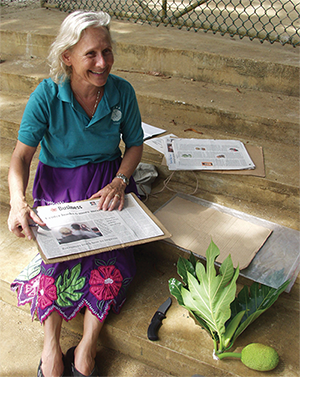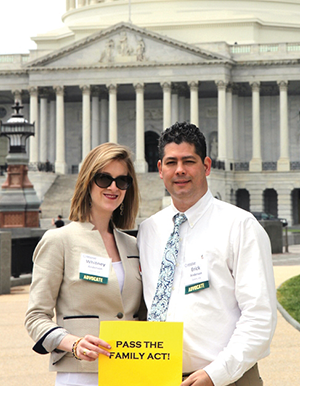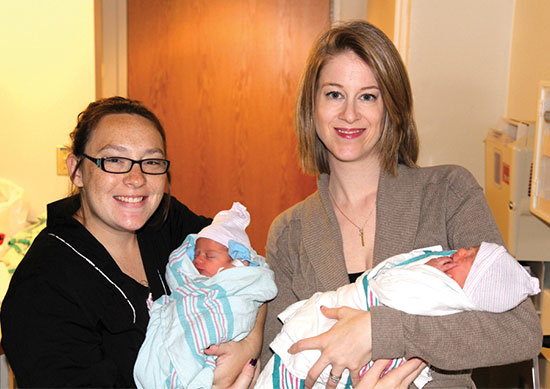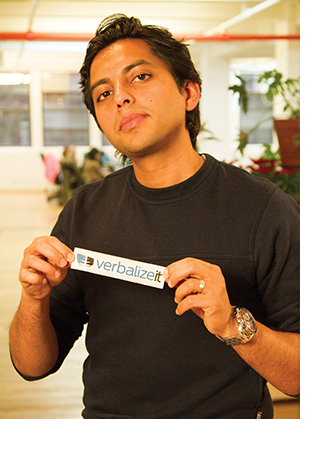ALUMNI SHORTS

Ever heard of breadfruit? Even residents of the beautiful island of Kauai, Hawaii, where breadfruit grows naturally, may ask that same question about the nutrition-rich fruit.
The island is home to the Breadfruit Institute—a part of the National Tropical Botanical Garden—and to the institute's executive director, Diane Ragone (horticulture '77). Raised in the Roanoke area, Ragone first became interested in plants through a botany class she took in her senior year of high school. The class "opened my eyes to a new way of looking at the world around me, [at] the fascinating nature [of] plants and their structure," said Ragone, whose interests in botany flourished when she studied horticulture at Virginia Tech.
Today, Ragone is dedicated to researching the nutritional benefits and sustainable nature of breadfruit. High in iron and other nutrients, the starchy fruit grows on trees in tropical climates—climates that are often found in developing countries where iron deficiency and malnutrition are significant problems.
At the institute, Ragone's efforts have been twofold: to research the propagation of breadfruit—the process of growing new plants by using roots or tissues from mature plants—to bring its nutritional benefits to larger populations; and to spread knowledge about the nutritional benefits of the fruit and to work with chefs and other culinary experts to find ways around the fruit's natural blandness.
Ragone and her team at the institute, along with colleagues at the University of British Columbia in Okanagan, have focused their research on bettering propagation. Previous methods were less successful and did not allow for quick growth; however, tissue culture, a new method of propagation, has revolutionized the speed at which breadfruit can be grown. Using the new method as a springboard, Ragone hopes to continue educating the world about the fruit's benefits.

Many people who struggle with infertility issues do so in silence—but that veil of secrecy will be a thing of the past if Whitney Saunders Anderson (international studies '99) has her way. By day the Internet communications manager for Roanoke College in Salem, Va., Anderson also dedicates much of her time to advocating for this very personal cause. "This is such a silent disease, and there are so many people that don't feel comfortable talking about it, and I do, so I just feel that I should," said Anderson. "We have to speak up, or nobody's going to do it for us."
Anderson and her husband, Erick, struggled with infertility issues for eight years—a difficult journey involving surgery and multiple miscarriages that they chronicled on their blog. The couple tried a number of approaches, including invitro fertilization (IVF), before they ended up working with a surrogate. Their twins were born in October 2013. "For people going through [infertility], my biggest piece of advice is that you don't have to go through it alone. Seek out a support group and find people you can talk to," said Anderson, who serves as a tireless advocate for infertility and adoption legislation and was recently honored by RESOLVE: The National Infertility Association as an "infertility hero."
In the U.S., couples who grapple with infertility are dealt an additional challenge, according to Anderson, since insurance doesn't typically provide coverage for treatment, the cost of which can easily reach thousands of dollars. "I really can't think of anything else that's a disease that has no coverage," Anderson said. "Some states have mandates, but there are a lot of loopholes, so [coverage isn't] a given, even in those states."
The fight is personal, but Anderson is working publicly on behalf of all patients who've faced infertility. Anderson's mission is twofold: to fight negative legislation that would hurt infertility patients and to press for positive legislation that would help. She has testified in front of the Virginia legislature against personhood legislation, which could have hindered infertility patients' access to certain treatments, and met with members of the U.S. Senate and House about the Family Act, which aims to provide a tax credit for costly IVF treatments. "There's really effective treatment out there, but many can't access it [because of cost]," said Anderson. "That is why the Family Act would be so important—it would offset some of [the cost] and give people a chance to afford [treatment]."

Though her family's journey has reached a happy ending, Anderson continues to fight to ensure that other couples can have the same opportunity. To read more about the Andersons' story, visit www.whitneyanderick.com. To learn more about infertility issues, visit www.resolve.org.

Visiting another country can be an eye-opening experience, but one that can quickly turn stressful for travelers who don't speak the language of the culture they're visiting. Enter Kunal Sarda (M.S. industrial and systems engineering '05), who hopes to remedy this problem with an app called VerbalizeIt.
The app allows users to quickly connect with live translators around the world for on-the-spot translations rather than having to rely on machine-generated translations that are often ineffective in conversational contexts.
The idea came about when Sarda realized that he had been pick-pocketed and had no money or a way to explain the situation to his French taxi driver. "What I ended up doing was calling a friend of mine on the phone who spoke French and having him translate on my behalf over the phone," Sarda said. "And that's where the light bulb went off."
While VerbalizeIt is helpful for world travelers, it has also proven useful in the business world. Businesses can sign up for the service for assistance in everything from translating documents to speaking with international clients.
The business world is taking notice. In May 2012, VerbalizeIt was accepted to Tech Stars, a technology incubator program, which gave his company new resources and networking capabilities. Shortly afterward, Verbalizelt appeared on an episode of ABC's "Shark Tank," which helped the app's name recognition. "It was amazing to be able to pick up the phone the next day to call potential partners and to hear them say, ‘Hey, we watched you guys on ‘Shark Tank!' It's a level of awareness that served us really well," Sarda said.
Today, VerbalizeIt is a global community of more than 14,000 translators—from professional translators to stay-at-home moms who can now leverage their skills—and is available in the 10 most commonly spoken languages in the business world. Looking back at how far the company has come since its conception only a few years ago, Sarda recognizes an important life lesson. "Fail quickly and learn from your mistakes," he said. "If you're not failing enough, that implies that you're not trying new things."
Produced by University Relations